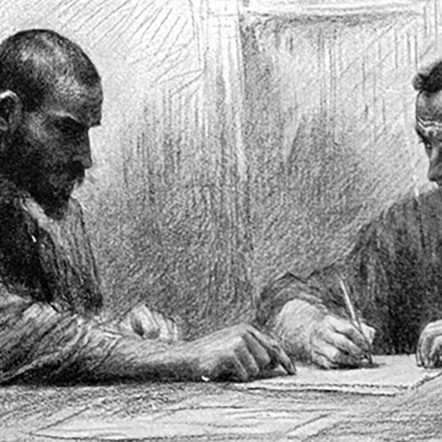I tell you, make friends for yourselves with dishonest wealth, so that when it fails, you will be welcomed into eternal dwellings. (Luke 16:9)
What could possibly be the meaning of such an obscure phrase? Evidently both back then and nowadays, dishonest, and heartless people are not heeding Jesus’ advice. They are totally focused on making money in any possible way, unmindful of how many people’s lives they might destroy in the process.
In our Gospel passage (Luke 16:1-13), we are confronted by an unusual way of creating a relationship with others. We receive a strange suggestion to avoid becoming an island and to resist the urge of exploiting others and treating them in a-less-than- Christian way. Jesus teaches this lesson with the story of the dishonest steward.
Let us be clear about one thing: the master of the estate doesn’t commend the dishonesty of his steward, but his prudence, his foresight. What Jesus stresses is the need for planning ahead so that we might be able to make a living both in abundance and in difficult times; never as an island, never alone, never exploiting others.
Jesus praises the skill, the uncanny ability to wiggle out of straits by relying on new friendships established at the minor expense of those who can afford a little loss.
If we were to divest ourselves of our Western mentality, we would see that the owner of the estate did not lose anything on the bottom line. True, with new promissory notes issued by his steward, he had lost some of the profit that he could have gotten with the original promissory notes. But he had gained the esteem of everyone in town for being so generous in writing off large chunks of what his debtors owed him. The prudence and foresight of the dishonest steward had improved considerably the image of his former boss.
If we want to put this lesson in plain English, we could say this: in time of crisis, our life depends on putting others under a lasting obligation to us. And, whenever we are in a crisis, we must resist the temptation to feel sorry for ourselves, clam up and turn into a distant island without a bridge to the mainland. Rather, we ought to prepare a better future for ourselves and our families by opening to others in any way possible.
Let us face it: no matter when the Lord might call us to render an account of how we are leading our life, he will always find big or small irregularities in our “bookkeeping.” The only way to save our stewardship is by … “cheating” in favor of our neighbor!
Let me give you a few examples of how we can put others under a lasting obligation to us:
By turning a blind eye whenever they hurt or insult us.
By letting go on minor things, on things that are not extremely important.
By avoiding rehashing old injustices.
By forgiving the wrongs done to us.
By overlooking the evident flaws in those whom the Lord has placed so close to us.
By erasing from memory all incidents of rudeness, curtness, and ill manners toward us.
And by treating others always in a kinder way than they treated us.
All this we should strive to do in view of possibly needing their help in the future.
If we were to go by our interpretation of justice, and to sever all ties, to refuse sincere forgiveness, to keep from doing the good we could do, whenever we would be in straits we would be all alone and, thus, easily overpowered.
Elsewhere in the Gospel, Jesus assures us that we will be forgiven in the measure we are willing to forgive others.
Now, if this is the way God will deal with us and this is exactly that to which we keep agreeing anytime we pray “forgive our trespasses and we forgive those who trespass against us” we would be in an endless heap of troubles with no escape route because what we owe him is so enormous.
It is a sign of skillful thinking to resort to “irregularities” (to be merciful rather than adhering to strict justice) in dealing with our neighbor. We ought to forgive the trespasses of others.
We cannot forget the incident of the thief who, dying next to Jesus on a cross, i.e., in time of the most severe crisis of his life, opens to Jesus and asks him for help. Jesus erases all his debts and takes him straight to heaven.
If we are smart, we start right now to open to others, showing more concern for them, caring for them, attending to their needs as best we can, loving them and overlooking whatever wrongs they might have done to us. Thus, we would make friends in eternal dwellings because the Lord will write off all our debts. This is indeed a foresighted, prudent way of living always open to love and forgiveness.








